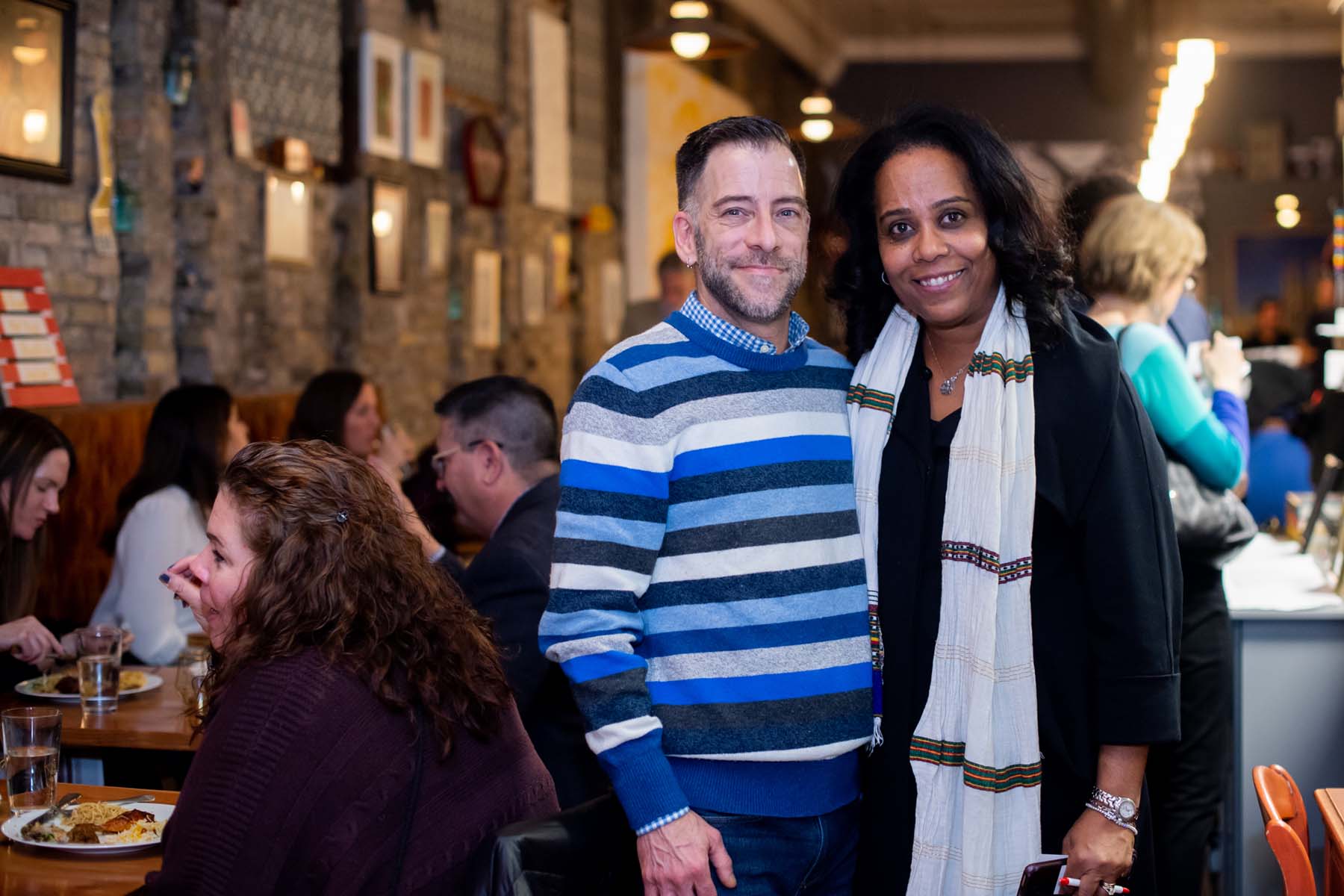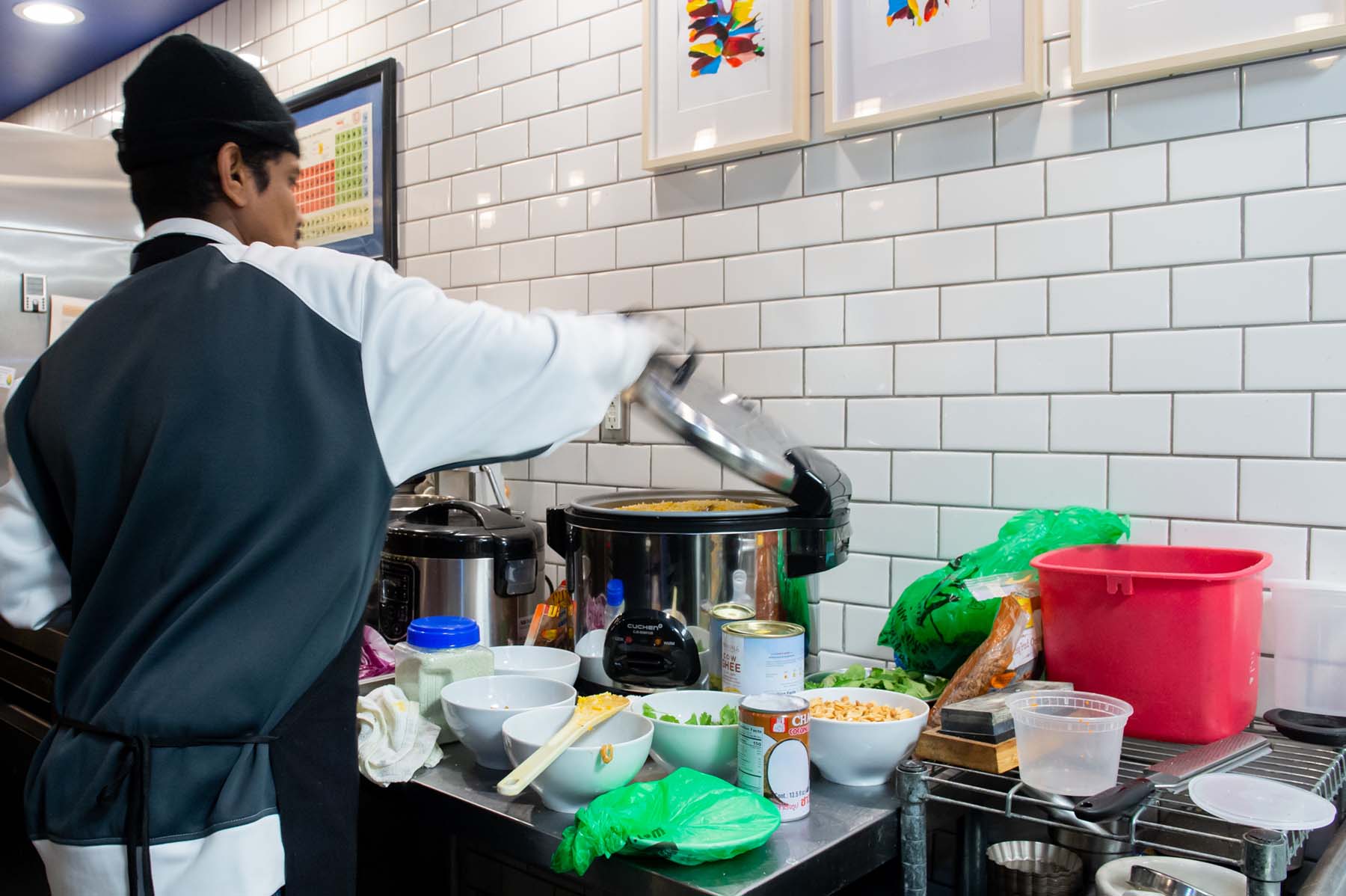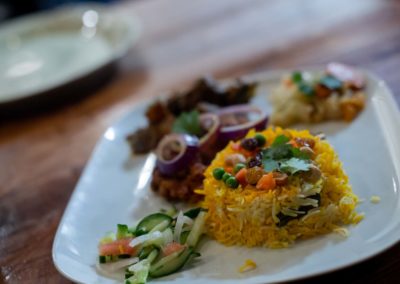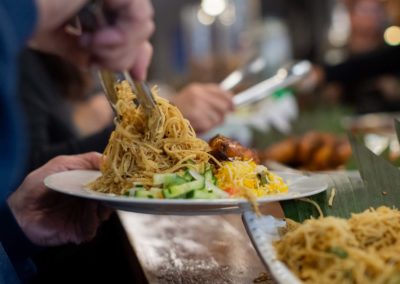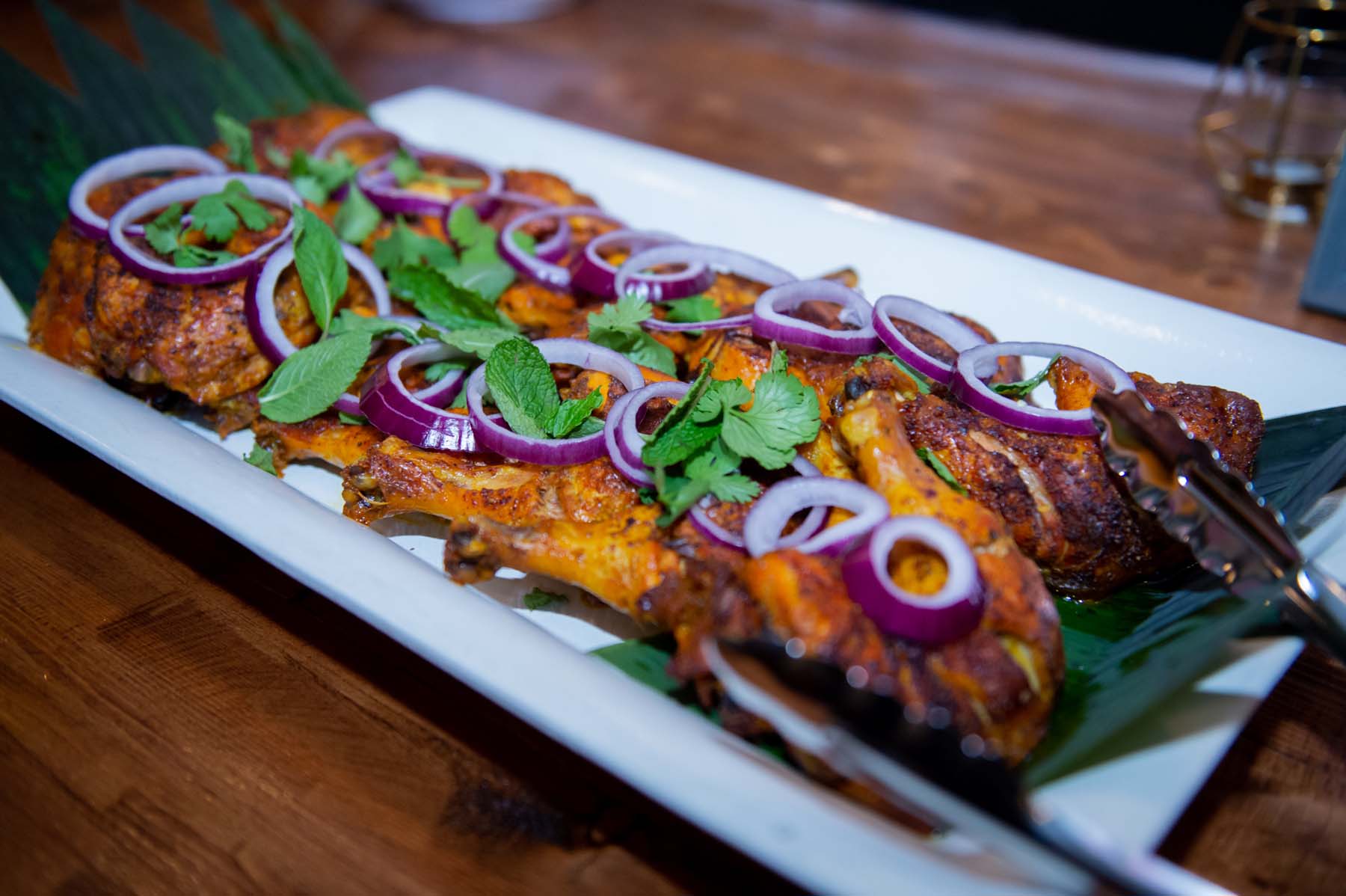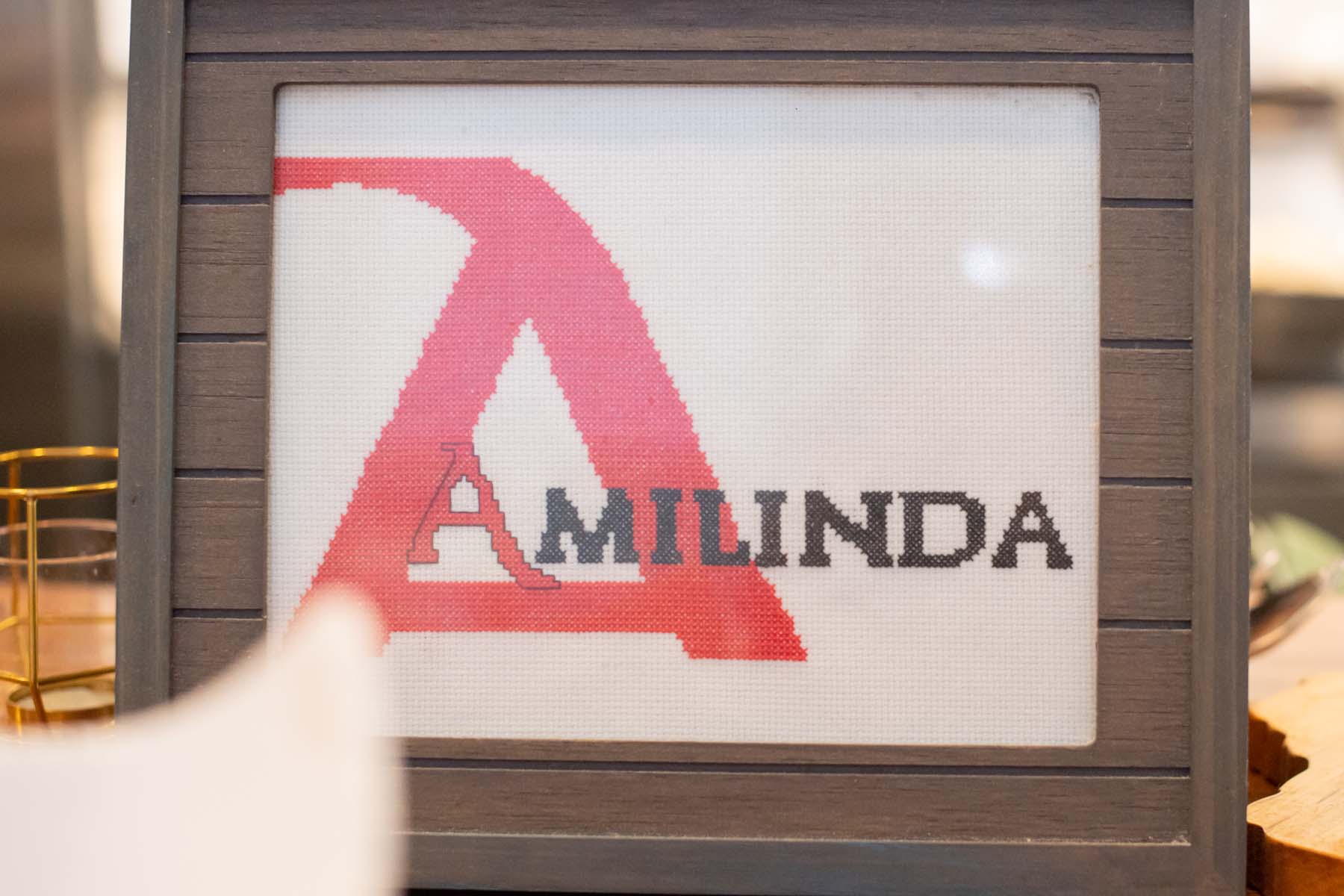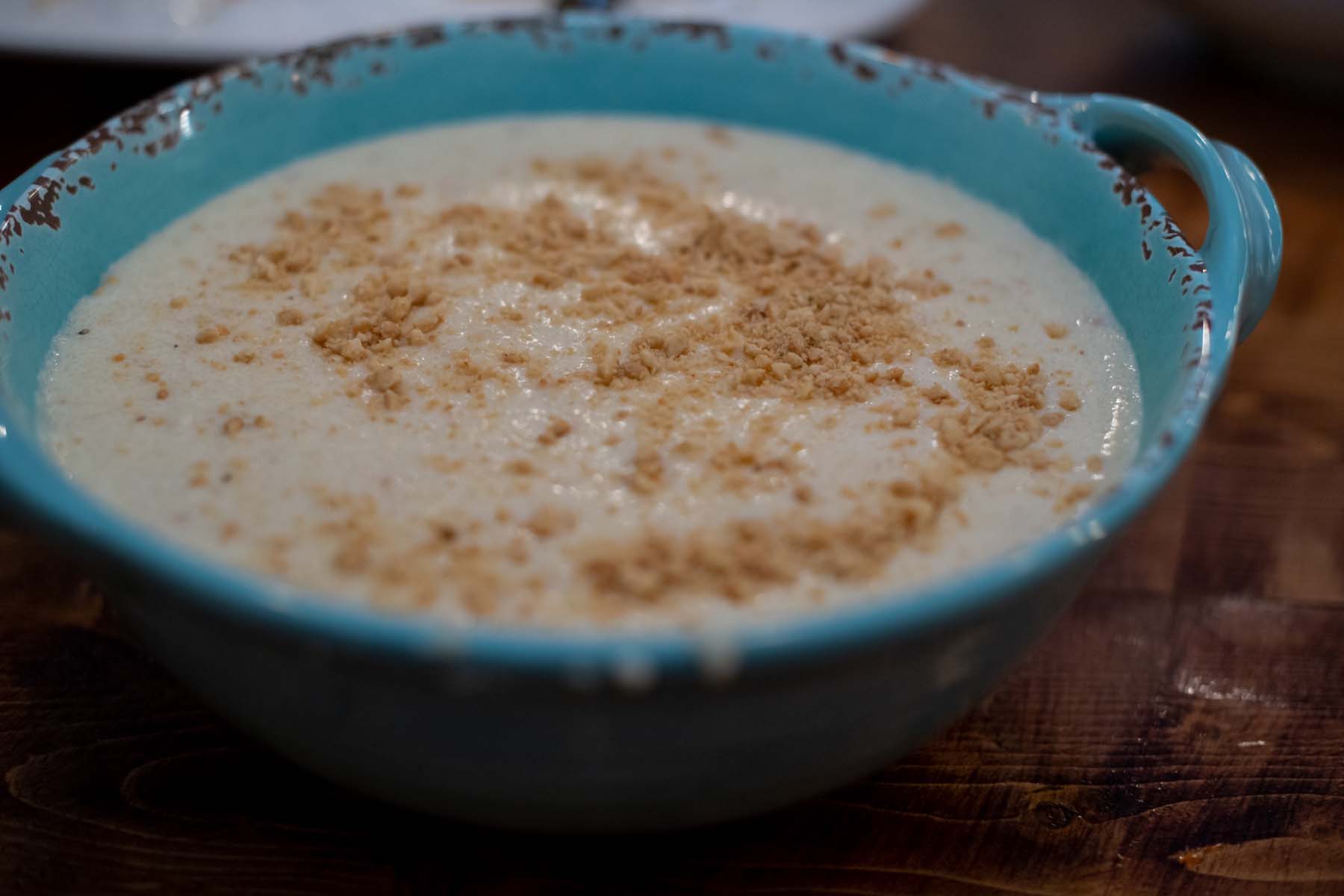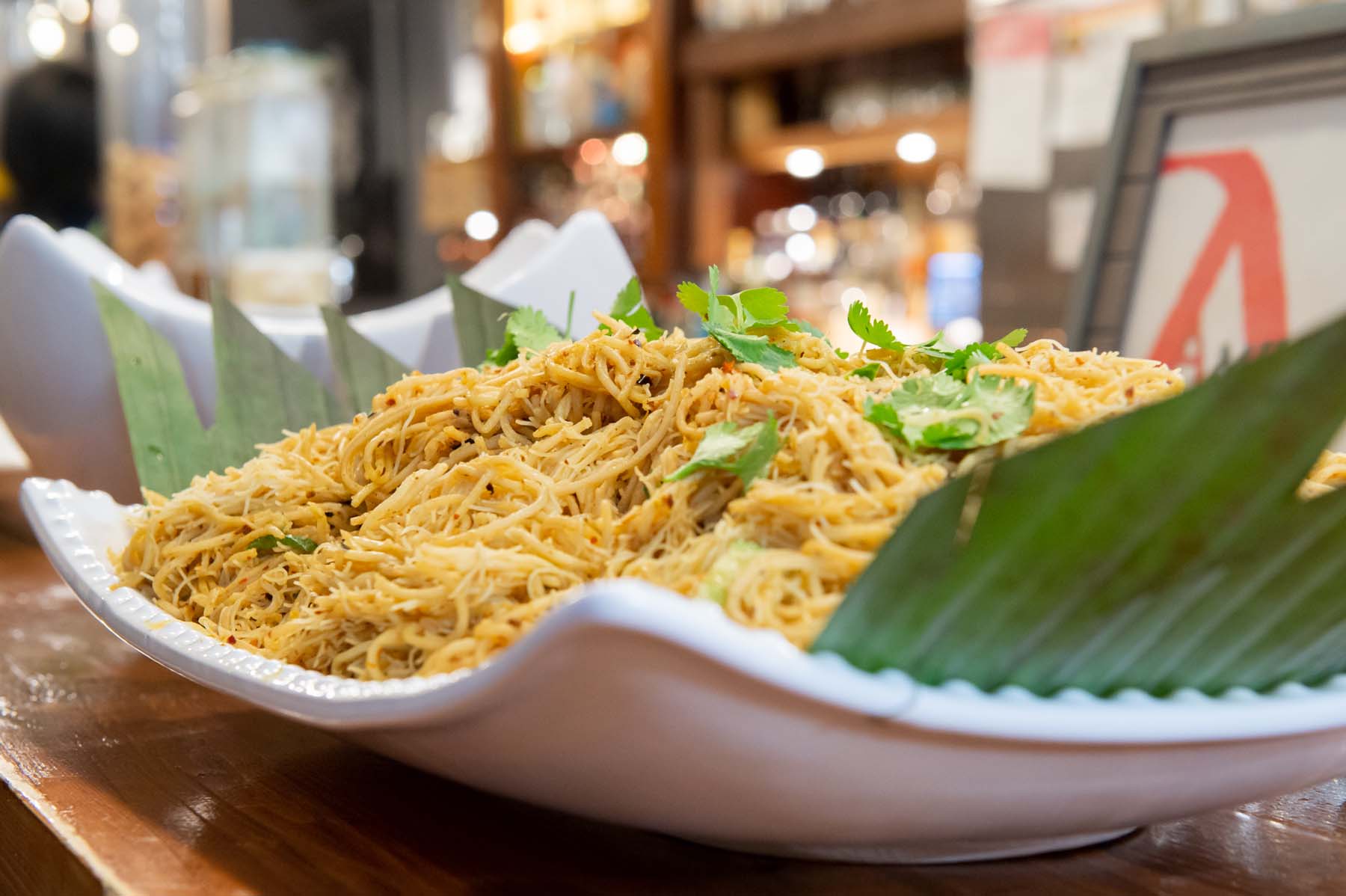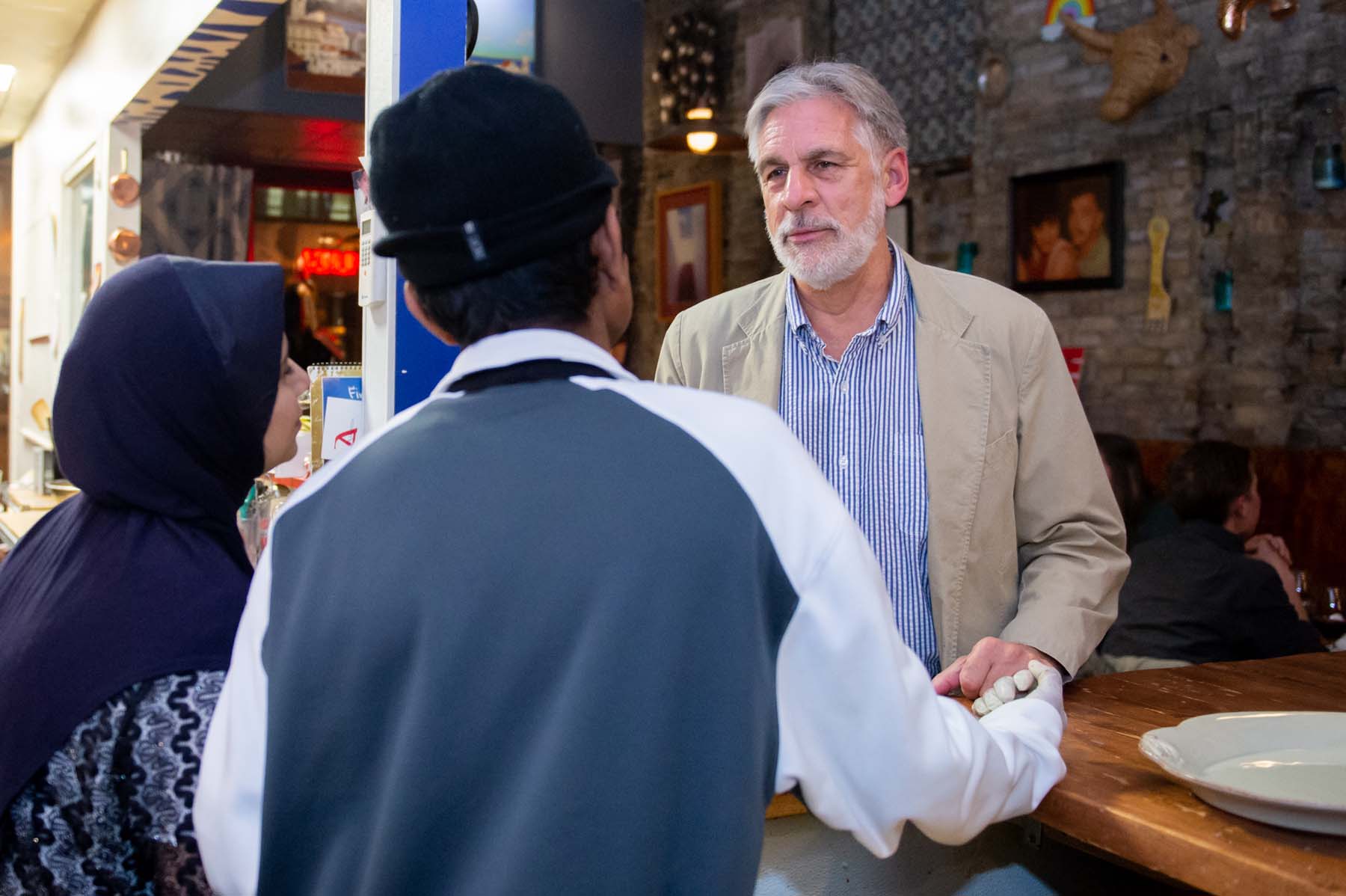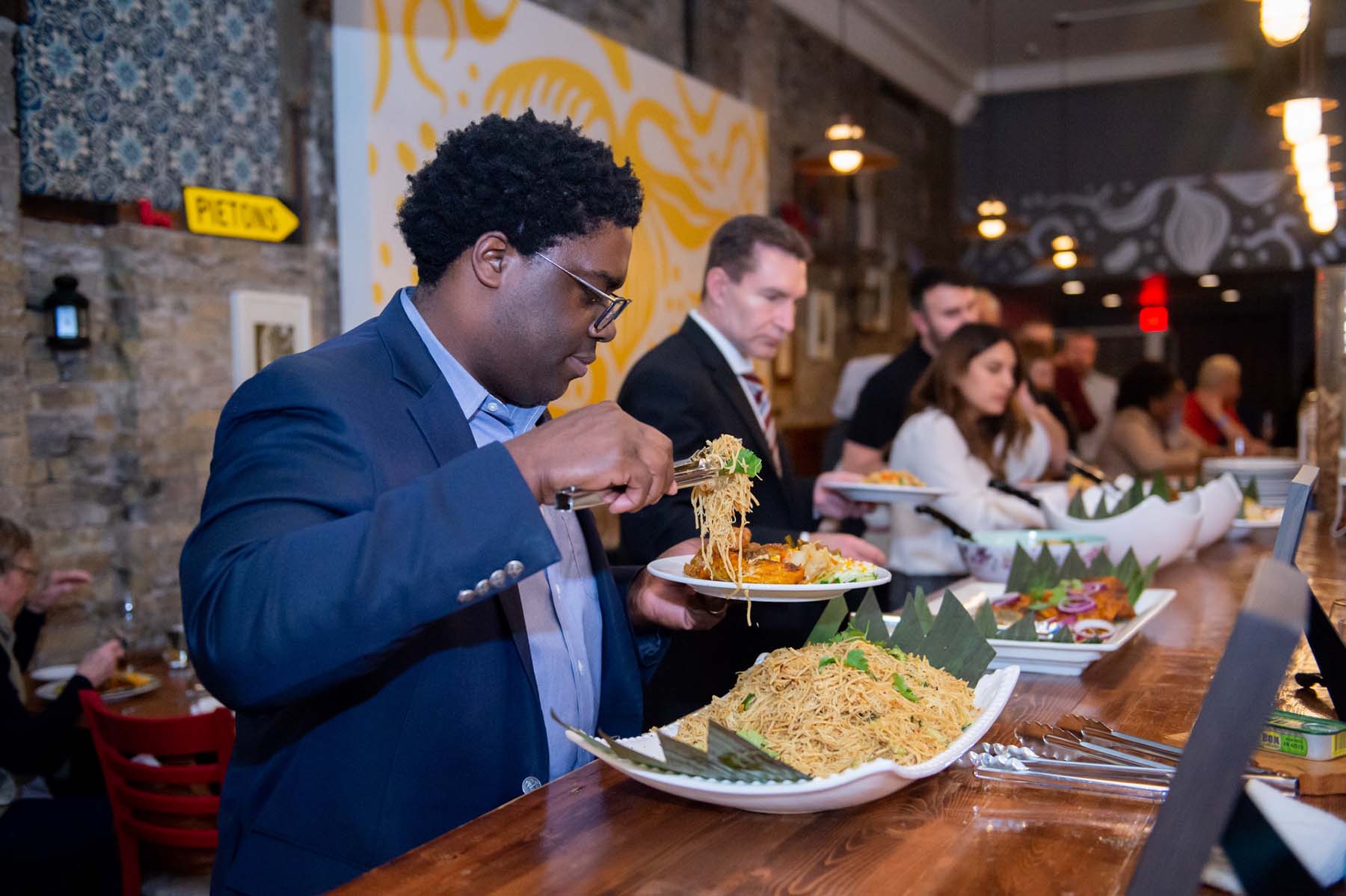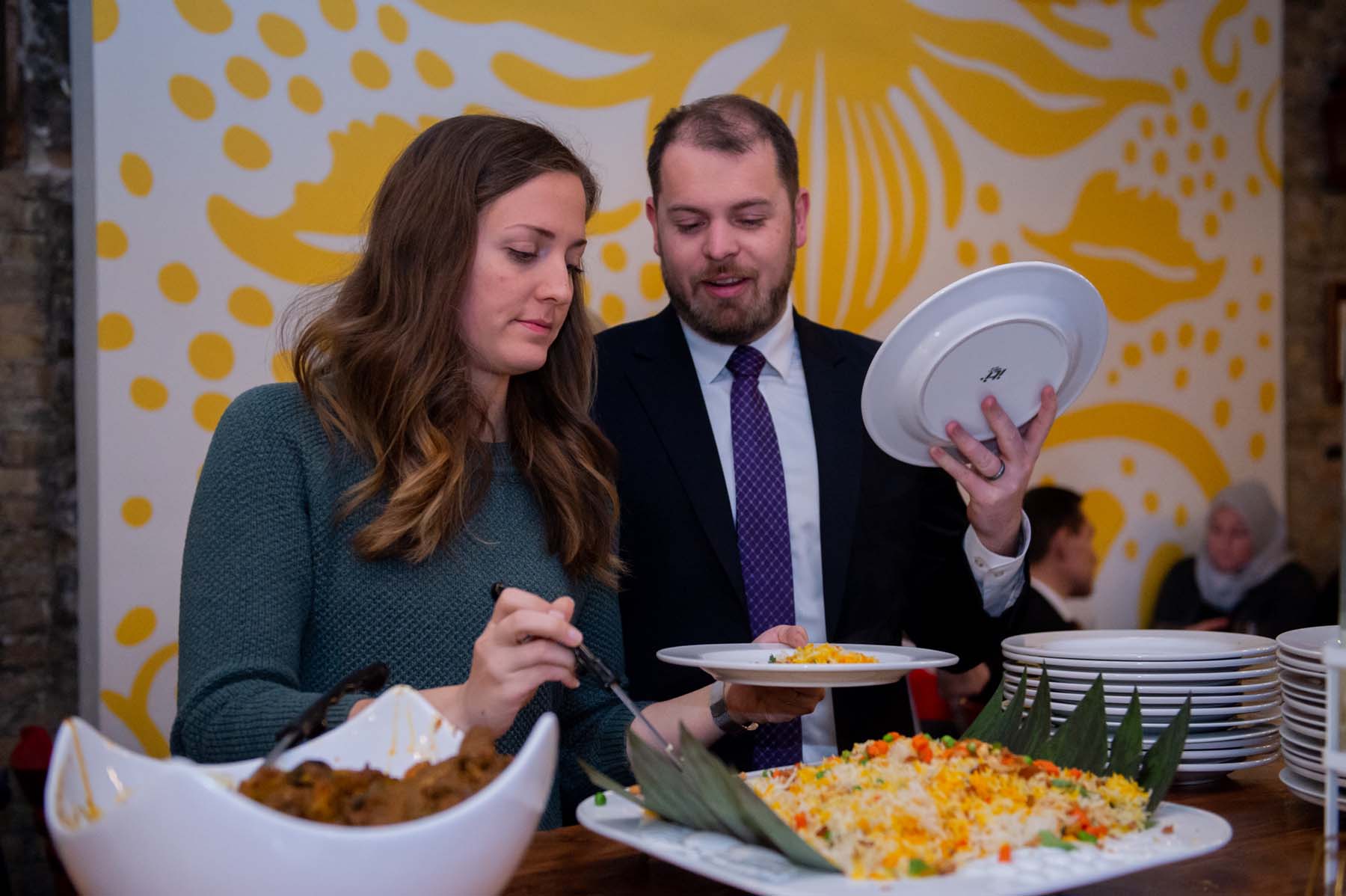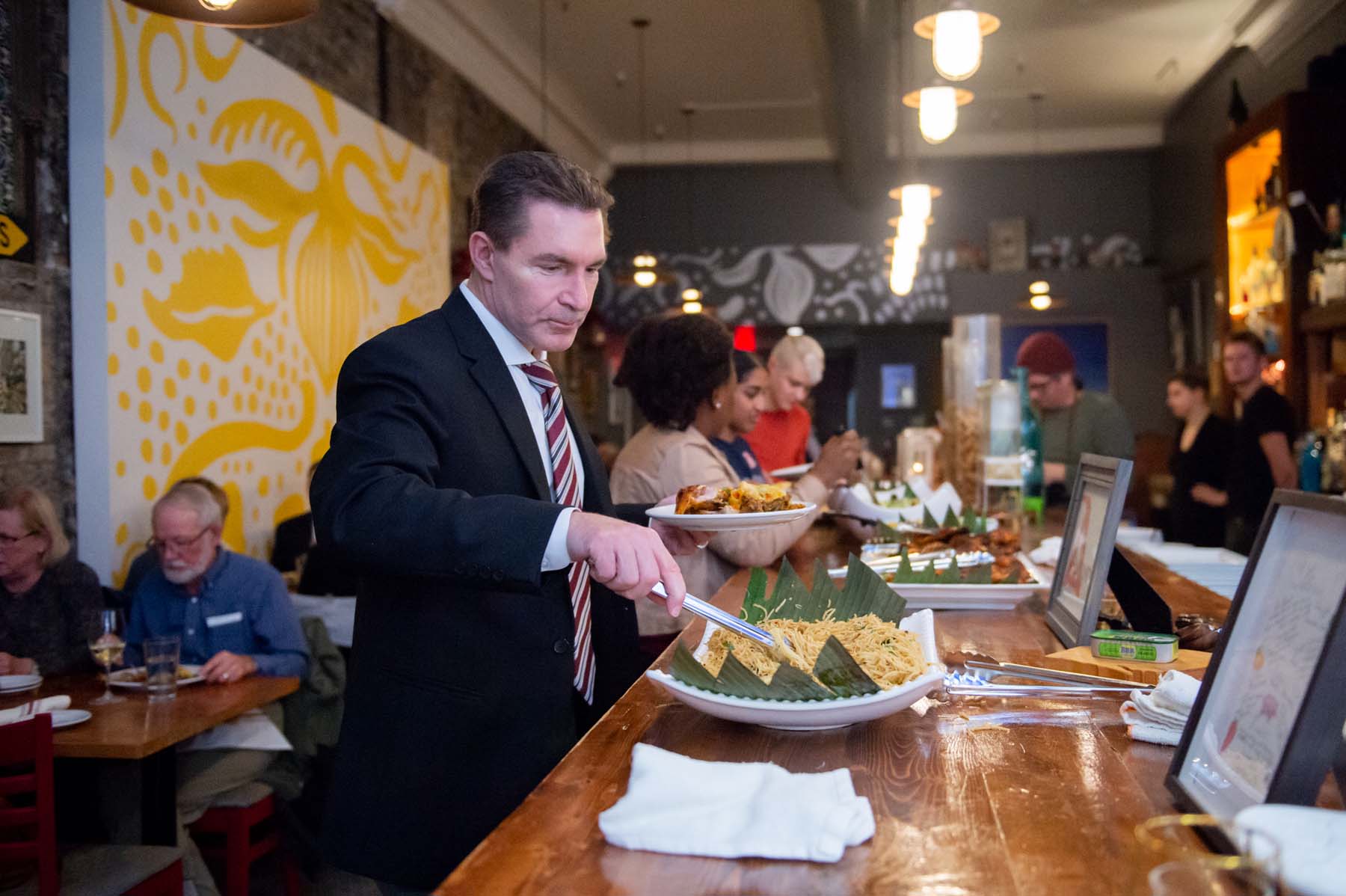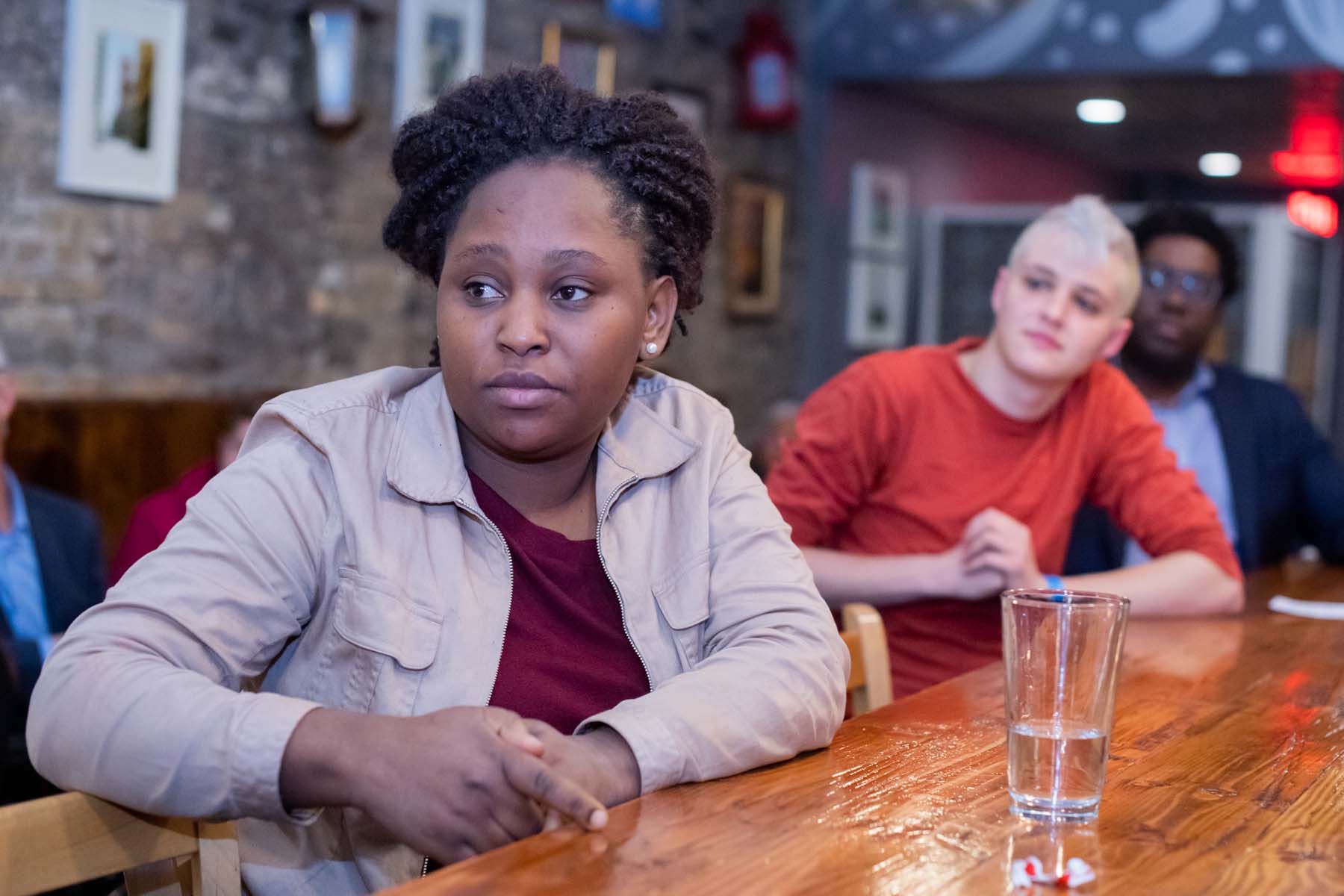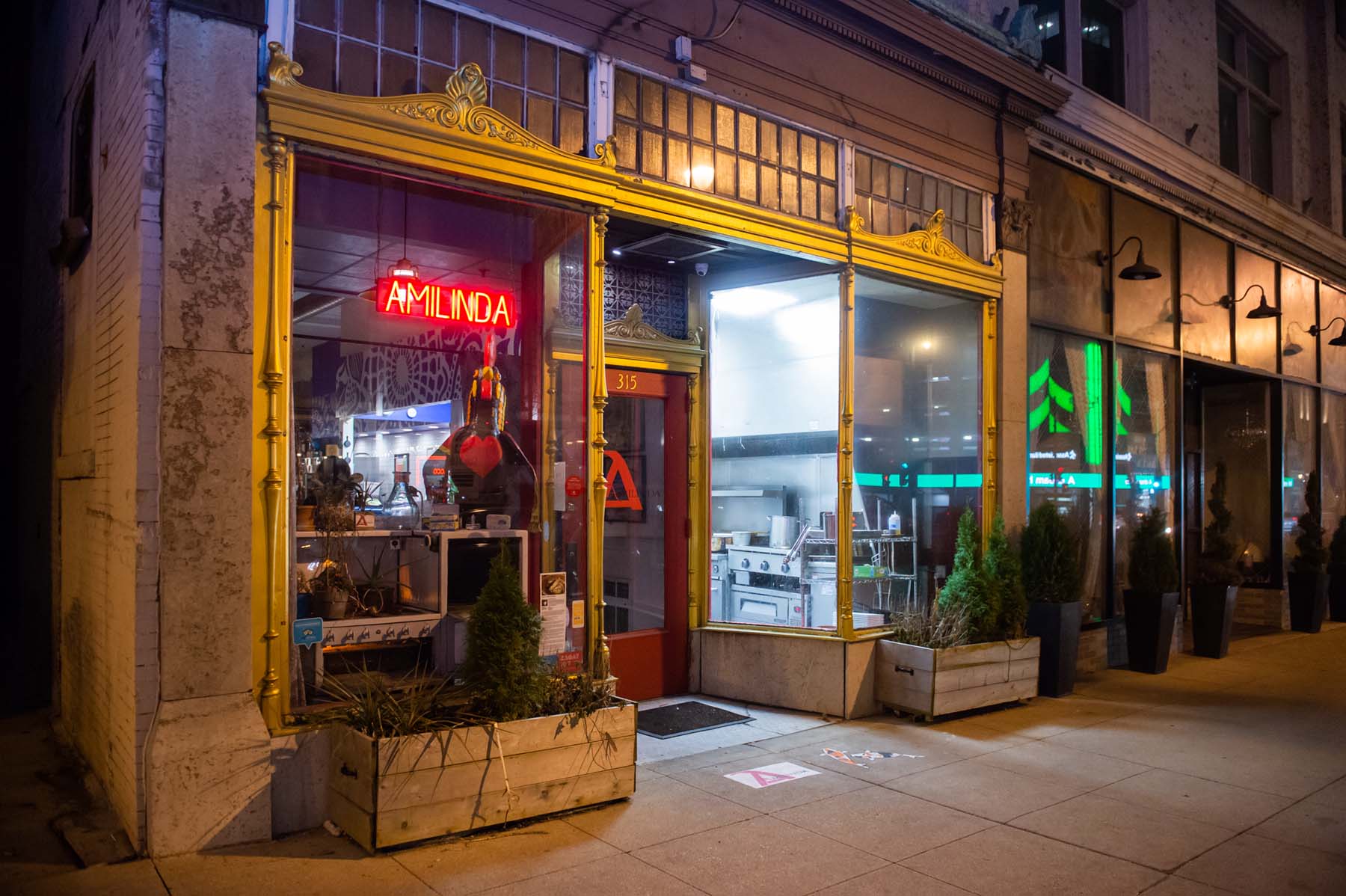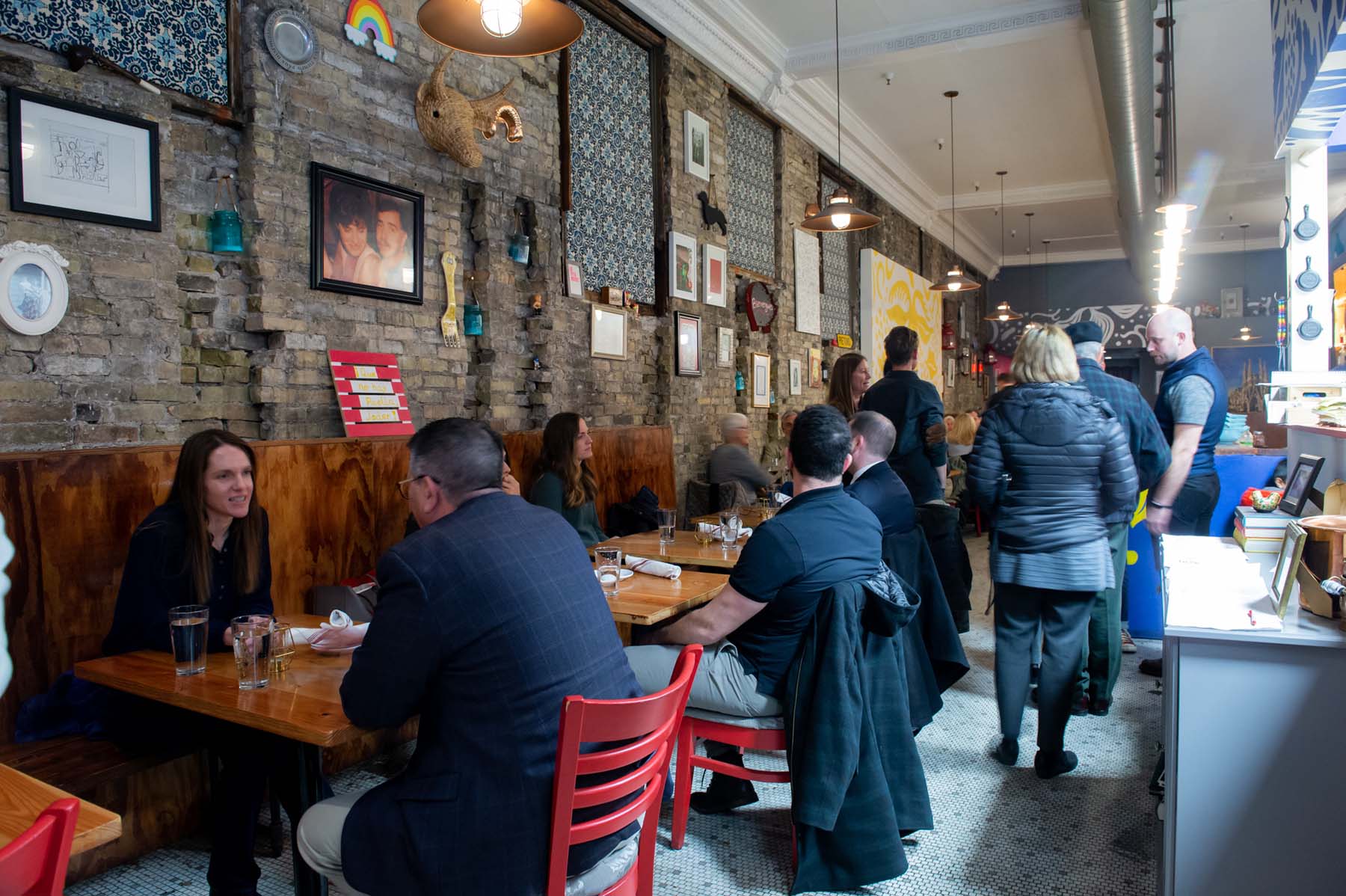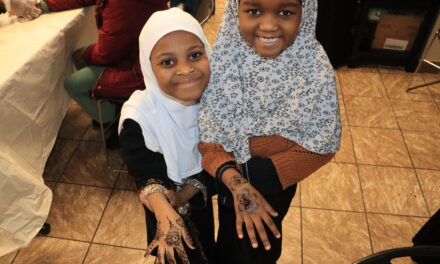Gregory León, co-owner of Amilinda, and Kai Gardner Mishlove, founder and organizer of Tables Across Borders
Mouna Photography for Wisconsin Muslim Journal
Amilinda, a Portuguese-Spanish-inspired restaurant on East Wisconsin Avenue, isn’t usually open Mondays, but on this Monday night in late November, it bustles with a Friday-night worthy crowd. Every table in the place is taken.
Amilinda is a storefront restaurant with exposed bricks, an open kitchen with dining counter, and a cozy bar near tall windows in the back. While Amilinda’s bar staff serves selections from the wine list, the Burmese-Malaysian menu is a departure. The food is prepared and the chefs are ready to start presenting it. Service tonight will be buffet-style.
Amilinda, owned by Gregory and Orry León, is one of three Milwaukee restaurants to donate their dining rooms and kitchens to Tables Across Borders, in which the cuisine of a particular Milwaukee refugee community is served to a pre-registered group of diners. Tickets are for food only. The tab for drinks is collected separately and goes to the house.
The two chefs, Chef Point and Chef Susan, are a Burmese Muslim couple, and tonight is a family affair. As the restaurant fills up with diners, Chef Susan tries to settle an argument between two of the three little boys swirling around their parents’ legs.
Chef Point and Chef Susan are not their real names, and the couple have asked not to be photographed. They speak through their hardworking interpreter, Kim Khaira.
As the platters of food are set out on the polished counter that separates the kitchen from the dining area, Chef Point thanks everyone for coming through his interpreter. A man in a white hat is standing behind the counter clearly confident in the chef’s role. He may need interpreting, but he doesn’t need coaching.
He and Chef Susan have prepared Lamb Curry with Potato, Tandoori Chicken, Patta Gobhi (a delicious stir-fried veggie dish), Burmese Noodle Salad, Biriyani Rice, and Cucumber Salad. For those not sampling the bar fare, there is Sweet Sooji Kheer and Myanmar Tea.
As I walk down the row of tables chatting with diners waiting to join the buffet line, a theme emerges. “What brings you here tonight?” I ask, and the answer is always, “I know Kai.”
Tables Across Borders is the brainchild of Kai Gardner Mishlove with support from her extensive network professional and volunteer network. Gardner Mishlove is the program coordinator for refugee services at Aurora Walker’s Community Point Clinic on Bruce Street, but Tables is something she does as a volunteer.
Kai tells me that tonight’s Burmese dinner is #8 in the series, which began last January. From January to May of this year, Amilinda and two other partner restaurants, Tandem and Tricklebee Café, hosted evenings devoted to Syrian, Serbian, Congolese, Ethiopian, Kiren, and Rohingya cuisine. An Eritrean dinner took place in October at Trickelbee Cafe. Kai’s purpose in starting the dinners was twofold, “To raise awareness of our new neighbors,” she says, and to foster entrepreneurship in the refugee community.
When it comes to entrepreneurship, Chef Point seems to need little encouragement. Before coming to Milwaukee, he worked in Malaysia, in his case at Spago and as a chef for Exxon Mobile. “All of the chefs who participated in this series are interested in opening up their own catering businesses or working in the food industry,” Kai tells me. “So this gives them that exposure. Many of them are in the process of getting their food licenses.”
Kai began her volunteer refugee resettlement work about five years ago. “Folks would invite me into their homes and say, ‘I made tea or coffee, I made lunch for you.’ [At first] I didn’t want to take food from someone on a limited income, but then I realized it was about building trust and becoming a part of the family.”
And it made Gardner Mishlove aware of the culinary talent in the refugee community. “Food is the glue that keeps a community together and a culture alive, especially when you’ve been uprooted. I was amazed at how people were able to adapt their recipes from home . . . [You] can feel the love in each dish, from the most elaborate to the most simple.” She says that starting the Tables program was her way of saying thank you for those great meals.
Among the diners that night was Alderman Tony Zielinski who sat at a four-top with his wife Annette, Sheila Badwan from Hanan Refugee Relief, and her friend Charity Bektesi. Like many at the dinner, Badwan has worked with Kai on issues impacting the refugee community.
“It’s a great cause. We’re happy to participate and contribute,” Zielinski said. When I joked that “this isn’t your district.” He replied, “It will be in the future.” It’s no secret that Zielinski plans to run against Tom Barrett in the next mayor’s race.
Ruth Wallace, who sat at a nearby table with her husband and another couple, said she connected with Kai through the National Council of Jewish Women. Ellen Mauermann heard Kai speak at NCJW and brought Beth Fairchild and Laura Laumekulonikeh. Leslie Davis, a psychologist with Walker’s Point Clinic, brought Liberty Hunter, a fan of world cuisine and a home chef. Musiimenta Sharon works with Kai as a volunteer doing refugee resettlement work.
Steven Robinson, Aurora’s senior administrator for the Metro Region, whom Kai introduces as her boss, says that “so much great work” being done by Aurora, including funding for the uninsured at the Bruce St. clinic, receives little attention. He quoted one of Advocate Aurora’s execs who recently said, “We’re here to serve the people of our community. Period.”
A food writer from Edible Milwaukee drops by the kitchen to ask about a particular spice in the salad as two photographers, one from Edible, one from WMJ, get shots of steaming platters and satisfied foodies. But there is a serious note to the event. On a shelf next the door are stacks of stapled-together sheets describing the current refugee crisis and encouraging tonight’s participants to call their legislators.
Chef Point and Chef Susan have the confident cheerfulness of people who know they are among the lucky ones. There are now more than 70 million refugees and displaced persons around the world. “It’s the worst humanitarian crisis we’ve ever seen,” Kai says. Like everyone connected with refugee resettlement in Milwaukee, Kai points out that the Trump administration, in the face of this crisis, has continually lowered the ceiling on refugee admissions, which now stands at 18,000, dropping this past September from an already low 30,000. Prior to Trump, the refugee admissions cap was set at approximately 95,000 per year.
Looking around Amilinda on Monday night, it’s hard to understand what motivates Trump and his supporters’ fear and dislike of immigrants. Even the conservative Cato Institute has said that the, “illegal-alien ‘problem’ is largely a creation of current policies. Open immigration would help the American economy, save tax dollars, enhance America’s image abroad, and substantially reduce our foreign-policy costs.”
But tonight’s event at Amilinda makes such concerns seem irrelevant. Tonight is more about family and friends. As Ruth Wallace says, “When you share a meal with somebody, it’s one of the most intimate things that can happen.”
The next dinner, to be held on Monday, December 2 at Tandem, starting at 6:00. p.m. and going till about 8:00., will feature Somali cuisine. Sponsored by the UWM Cultures and Communities, the Somali dinner is already sold out. “All of them have been sold out,” Kai says. But you can check the Tables Across Borders Facebook page for more information.
